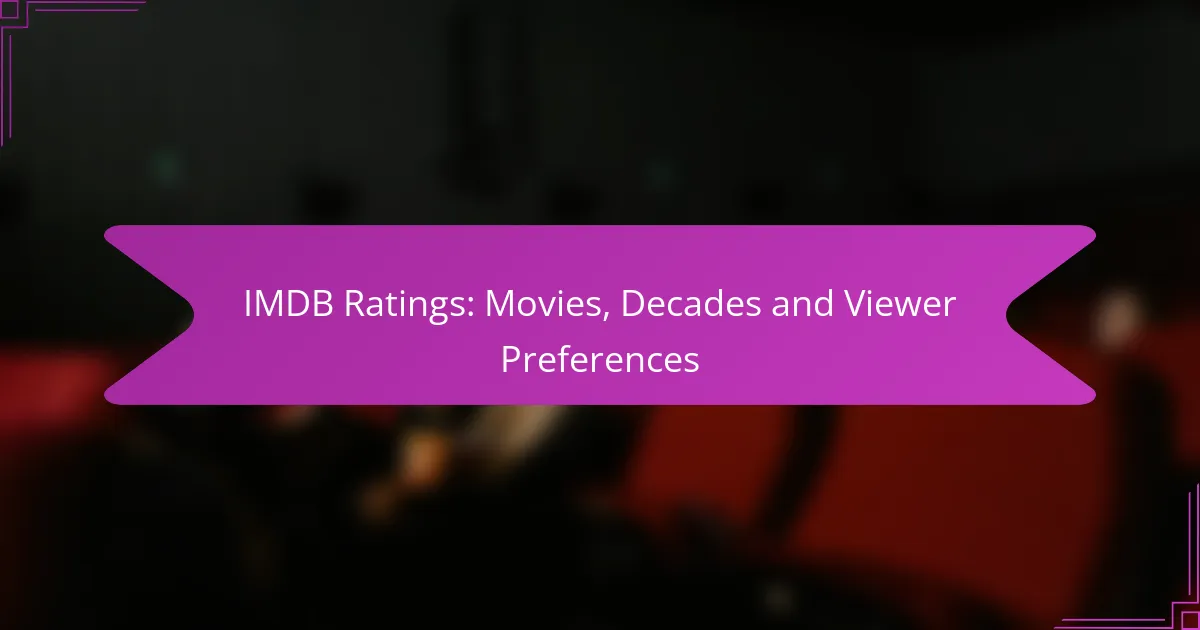IMDB reviews reveal a notable trend where original films often achieve higher ratings than their remakes, indicating a preference for innovative storytelling. Audience reception is shaped by factors such as storyline originality, cast performance, and director reputation, all of which significantly influence ratings. Interestingly, some remakes have managed to surpass their originals by combining fresh narratives with nostalgic elements, attracting both new viewers and fans of the original films.
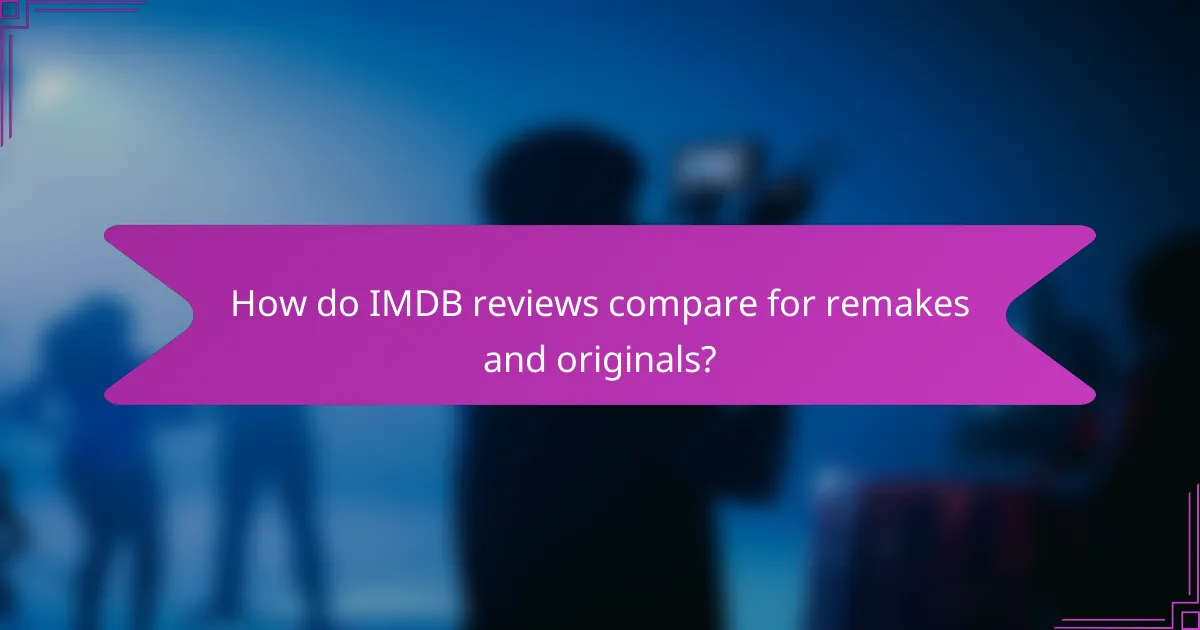
How do IMDB reviews compare for remakes and originals?
IMDB reviews often show that original films tend to receive higher ratings compared to their remakes. This trend reflects audience preferences for fresh storytelling and unique concepts over rehashed ideas.
Higher ratings for originals
Original films generally achieve better IMDB ratings, often because they present unique narratives and innovative filmmaking. Audiences appreciate the creativity and originality, which can lead to a more favorable reception.
For example, original films like “Inception” or “Get Out” have garnered ratings in the high sevens to mid-nines, while remakes of classics often struggle to reach similar heights. This preference highlights the value viewers place on new ideas.
Mixed reception for remakes
Remakes often receive a mixed reception, with ratings that can vary significantly. While some remakes succeed in capturing the essence of the original, others may fail to resonate with audiences, leading to lower ratings.
Films like “The Lion King” (2019) received a range of reviews, with some praising the visuals while others criticized the lack of emotional depth compared to the original. This inconsistency in reception underscores the challenges remakes face in meeting audience expectations.
Audience expectations differ
Audience expectations for originals and remakes differ significantly, influencing how films are rated. Viewers often approach originals with curiosity and openness, while remakes are scrutinized against the beloved originals.
This scrutiny can lead to harsher criticism for remakes, as fans of the original may have specific expectations regarding character development and plot fidelity. Understanding these dynamics can help filmmakers navigate audience reception more effectively.
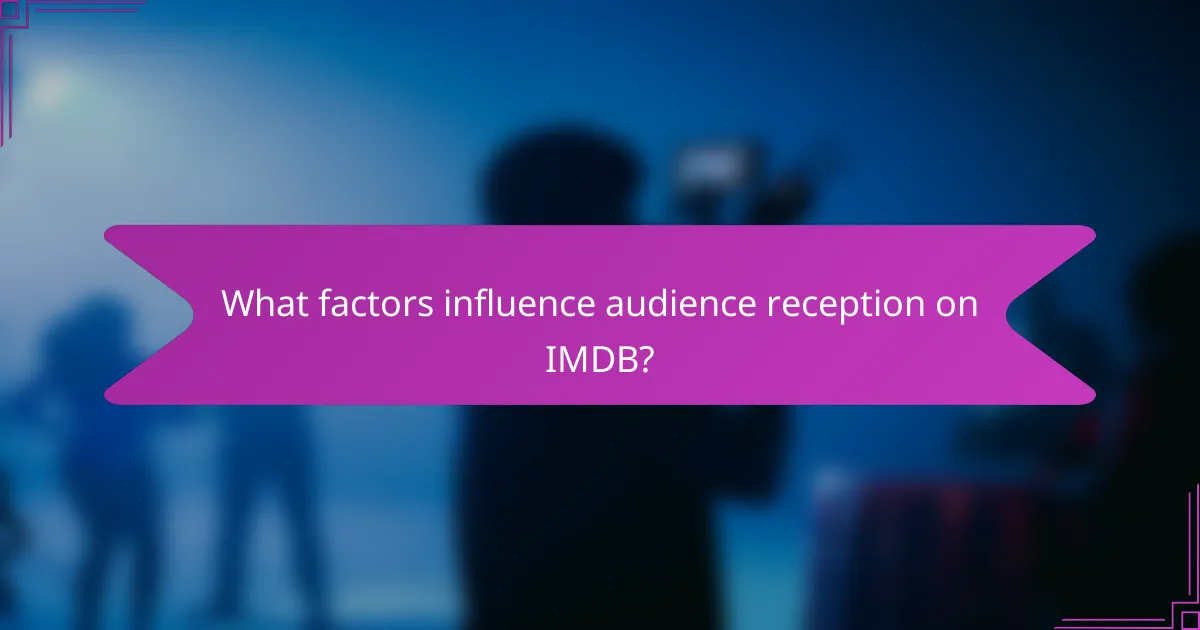
What factors influence audience reception on IMDB?
Audience reception on IMDB is influenced by several key factors, including the originality of the storyline, the performance of the cast, and the reputation of the director. These elements collectively shape viewers’ perceptions and ratings, impacting a film’s overall success on the platform.
Storyline originality
Storyline originality plays a crucial role in how audiences perceive a film. Unique and innovative plots tend to attract more positive reviews, while remakes or predictable narratives may receive lower ratings. For instance, films that offer fresh perspectives or unexpected twists often stand out in audience evaluations.
When assessing originality, consider how a film compares to existing works. A story that creatively reinterprets familiar themes can resonate well, while a direct copy may struggle to engage viewers. Aim for originality that enhances the narrative without alienating fans of the original material.
Cast performance
The performance of the cast significantly impacts audience reception on IMDB. Strong acting can elevate a film, making characters relatable and memorable, which often leads to higher ratings. Conversely, lackluster performances can detract from the overall experience, even if the storyline is compelling.
To gauge cast performance, look for reviews that highlight specific actors’ contributions. Films featuring well-known and respected actors may benefit from their established fan bases, while lesser-known talents can shine if they deliver exceptional performances. Audiences appreciate authenticity and emotional depth in acting.
Director’s reputation
A director’s reputation can heavily influence audience reception on IMDB. Established directors with a history of successful films often attract viewers who trust their vision, leading to higher initial ratings. In contrast, a debut director may face skepticism, regardless of the film’s quality.
When evaluating a film, consider the director’s previous works and their impact on audience expectations. A director known for a specific genre may be judged more critically if they venture into unfamiliar territory. Pay attention to how a director’s style and past successes shape audience opinions and ratings.

Which remakes have received the best IMDB reviews?
Several remakes have garnered high ratings on IMDB, often surpassing their original counterparts. These films typically blend innovative storytelling with nostalgia, appealing to both new audiences and fans of the originals.
The Thing (1982)
John Carpenter’s “The Thing” is a remake of the 1951 film “The Thing from Another World” and has achieved a cult status over the years. With an IMDB rating often in the low nineties, it is celebrated for its groundbreaking practical effects and intense atmosphere.
The film’s success lies in its ability to create suspense and paranoia among the characters, set against the backdrop of a remote Antarctic research station. Viewers appreciate the blend of horror and science fiction, making it a standout in the genre.
Scarface (1983)
Brian De Palma’s “Scarface,” a remake of the 1932 film of the same name, has become iconic, frequently rated in the high eighties on IMDB. The film’s portrayal of Tony Montana, played by Al Pacino, has left a lasting impact on popular culture.
Its gritty depiction of the drug trade in Miami during the 1980s resonates with audiences, showcasing themes of ambition and excess. The film’s memorable quotes and intense performances contribute to its enduring popularity.
It (2017)
The 2017 adaptation of Stephen King’s “It” has received significant acclaim, often rated in the mid-eighties on IMDB. This remake successfully captures the horror elements of the original miniseries while introducing a fresh perspective on the story.
By focusing on the bond between the young characters, known as the Losers’ Club, the film emphasizes friendship amidst fear. Its combination of jump scares and emotional depth has resonated with both fans of the novel and new viewers alike.
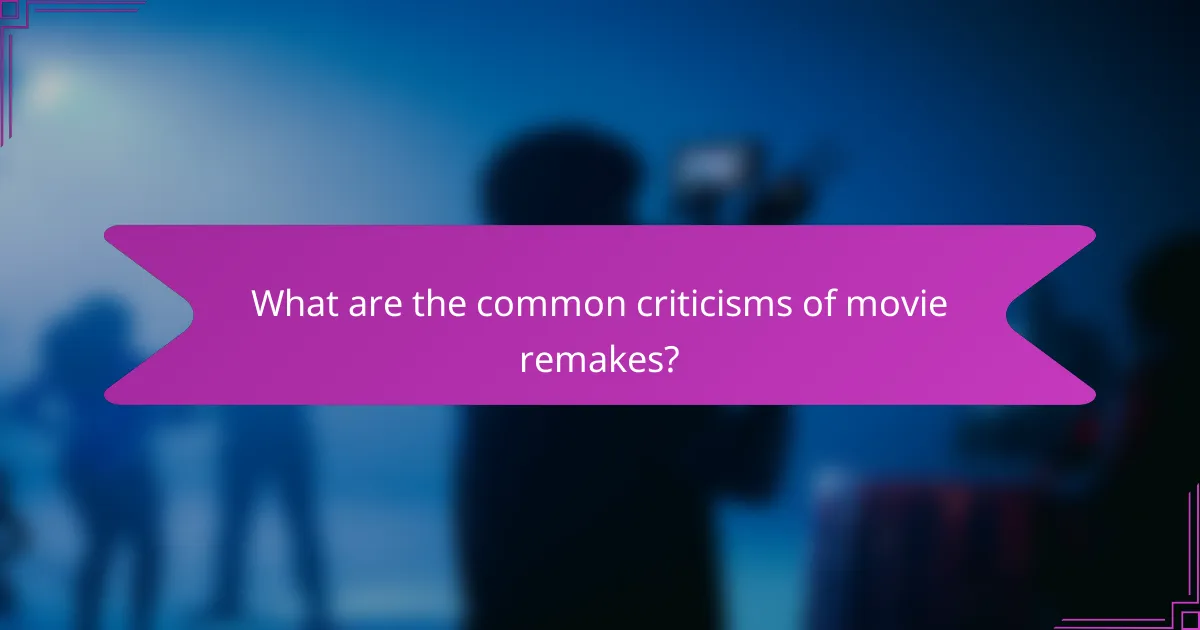
What are the common criticisms of movie remakes?
Common criticisms of movie remakes often center around their lack of originality, poor casting choices, and unfaithfulness to the source material. These issues can lead to disappointment among audiences who have high expectations based on the original films.
Lack of originality
A primary criticism of remakes is their perceived lack of originality. Many viewers feel that remakes recycle ideas without adding new perspectives or creativity, leading to a sense of déjà vu. This can diminish the excitement and engagement that audiences seek from new films.
For example, when a classic film is remade, audiences may expect innovative storytelling or fresh interpretations. However, if the remake closely mirrors the original, it often fails to resonate, resulting in negative reviews and lower audience ratings.
Poor casting choices
Another common criticism involves poor casting choices that do not align with audience expectations. Fans of the original film often have strong attachments to the original actors, and when remakes feature different casts, it can lead to dissatisfaction. Casting decisions that seem out of character or lack chemistry can further alienate viewers.
For instance, if a beloved character is portrayed by an actor who does not embody the essence of the original role, it can detract from the film’s overall quality. This can lead to harsh critiques on platforms like IMDb, where audiences express their disappointment.
Unfaithfulness to source material
Unfaithfulness to the source material is a significant concern for many viewers. When remakes deviate too far from the original storyline, themes, or character arcs, they risk alienating fans who cherish the original work. Changes that seem unnecessary or poorly executed can result in backlash from audiences.
For example, altering key plot points or character motivations can frustrate viewers who expect a faithful adaptation. This often leads to negative reviews and lower ratings, as audiences feel that the remake has disrespected the legacy of the original film.
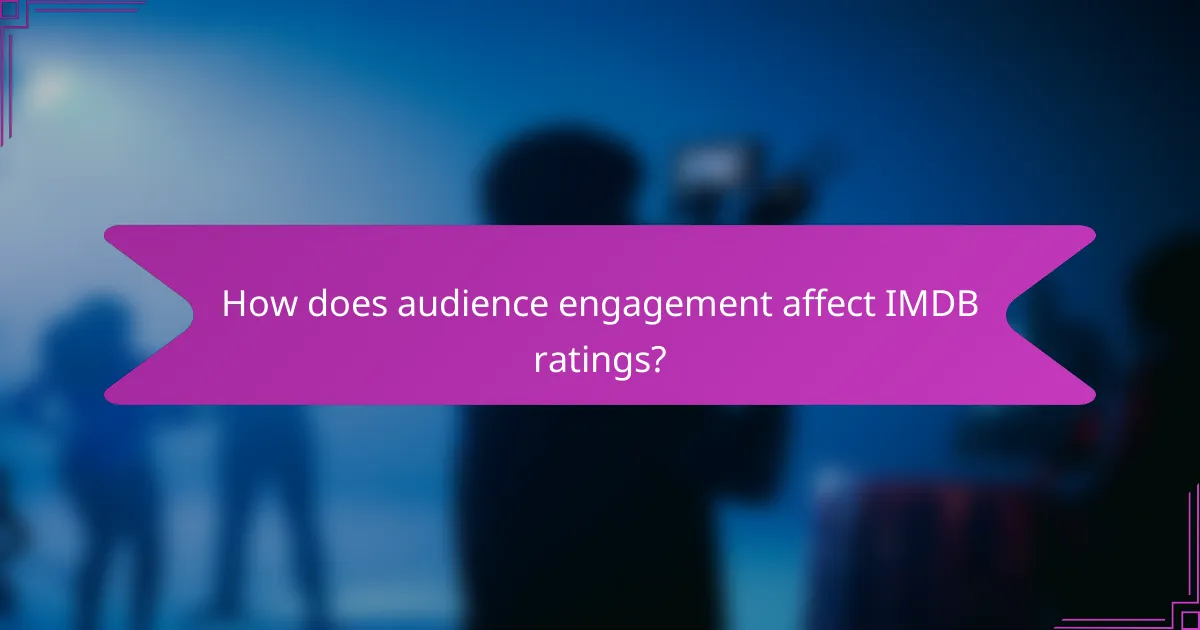
How does audience engagement affect IMDB ratings?
Audience engagement significantly influences IMDB ratings, as higher interaction often correlates with increased ratings. Factors such as social media discussions, viewer demographics, and the contrast between critics and audience scores all play a role in shaping how films are rated on the platform.
Social media buzz
Social media buzz can dramatically impact IMDB ratings by amplifying audience opinions and encouraging discussions. Films that generate significant online chatter often see a spike in ratings as enthusiastic viewers share their experiences and recommendations. For example, a movie trending on platforms like Twitter or Instagram may attract more viewers, leading to a higher volume of ratings.
Conversely, negative buzz can lead to lower ratings, as dissatisfied viewers may take to social media to express their discontent. This can create a ripple effect, where potential viewers are deterred from watching the film based on the prevailing sentiment.
Viewer demographics
Viewer demographics play a crucial role in shaping IMDB ratings, as different age groups and cultural backgrounds may have varying tastes and expectations. For instance, younger audiences might favor action-packed blockbusters, while older viewers may appreciate character-driven dramas. This diversity in preferences can lead to polarized ratings for the same film.
Understanding the demographic breakdown of a film’s audience can provide insights into its ratings. Films that resonate with a specific demographic may receive higher ratings from that group, while failing to connect with others could result in lower scores.
Critics vs. audience scores
The disparity between critics’ scores and audience ratings often highlights differing perspectives on a film’s quality. Critics typically evaluate films based on artistic merit, technical execution, and storytelling, while audiences may prioritize entertainment value and emotional impact. This can lead to notable differences in ratings.
For example, a film might receive high praise from critics for its cinematography but receive mixed reviews from audiences who find it slow-paced. Understanding this dynamic can help viewers interpret IMDB ratings more effectively, as a film with a low audience score but high critic rating may still be worth watching for certain viewers.

What trends are emerging in audience reception of remakes?
Audience reception of remakes is increasingly influenced by nostalgia and a focus on diversity in casting. These trends shape how viewers perceive and engage with both new adaptations and original stories.
Increased nostalgia factor
The nostalgia factor plays a significant role in how audiences receive remakes. Many viewers are drawn to familiar stories and characters, often leading to heightened expectations based on their fond memories of the originals.
For example, remakes of classic films from the 1980s and 1990s often attract audiences who grew up with those movies. This can create a double-edged sword; while it may boost initial viewership, it can also lead to disappointment if the remake fails to capture the essence of the original.
Focus on diversity in casting
There is a growing emphasis on diversity in casting for remakes, reflecting broader societal changes. Audiences increasingly expect films to represent a wider range of backgrounds and experiences, which can enhance relatability and engagement.
For instance, remakes that feature diverse casts not only appeal to a broader audience but also can bring fresh perspectives to well-known stories. This trend encourages filmmakers to rethink traditional narratives and adapt them to be more inclusive, which can positively influence audience reception.

